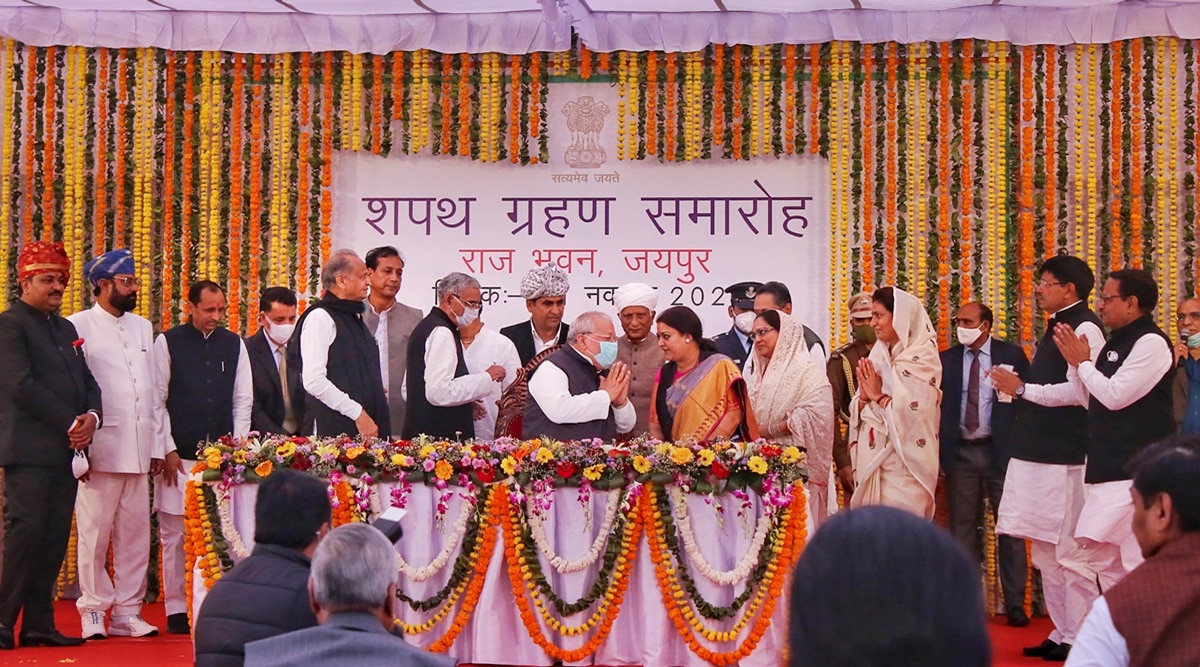 Rajasthan Chief Minister Ashok Ghelot and Rajasthan Governor Kalraj Mishra pose with new Cabinet Ministers after the swearing-in ceremony at Raj Bhawan in Jaipur, Sunday, Nov. 21, 2021. (PTI Photo)
Rajasthan Chief Minister Ashok Ghelot and Rajasthan Governor Kalraj Mishra pose with new Cabinet Ministers after the swearing-in ceremony at Raj Bhawan in Jaipur, Sunday, Nov. 21, 2021. (PTI Photo) After the leadership change in Punjab, the expansion of the Ashok Gehlot Cabinet in Rajasthan is yet another instance of a decisive intervention by the Congress high command. And the reshuffle has multiple messages to all the stakeholders. Now it is up to the leaders how they choose to read the signals.
The first and perhaps the most important message is to the veteran Gehlot — that running of the government cannot be a one-man show. His wings are certainly not clipped but by nudging him to expand the Cabinet by ensuring a good enough representation to those close to his bete noire Sachin Pilot, by keeping the Independents who are close to him out, the high command has made it clear that its writ should run.
On the other hand, the expansion is not Pilot-centric either. In the entire council of ministers, only five are his loyalists. That should make Gehlot happy. But by laying stress on sizable representation for Scheduled Castes and Scheduled Tribes in the council of ministers, the high command ensured that both Gehlot and Pilot were boxed into a corner.
Moreover, the high command has tried to create a new leadership. Although the Rajasthan Congress story will still revolve around Gehlot and Pilot, the leadership, by giving important organisational roles to Raghu Sharma, a Brahmin, Harish Chaudhary and Govind Singh Dotasra, both from the Jat community, and Bhanwar Jitender Singh, a Rajput, has thrown more leaders from varied backgrounds into the mix. Singh is AICC in charge of Assam.
Gehlot was initially said to be reluctant to induct Pilot loyalists. “But we did not need to force him. After two meetings with high command leaders last month, Gehlot got the signal. He understood the mind of the high command. Unlike Amarinder Singh, Gehlot is an organisational man, risen to the top through the ranks. In fact, he was at the airport when Ajay Maken landed in Jaipur a couple of days ago with the mandate to execute the reshuffle,” a leader said.
“Gehlot is not Amarinder and Sachin is not (Navjot Singh) Sidhu. There is a difference. Gehlot is not temperamental like Captain. And knows the virtues of patience and silence,” another leader said.
Party leaders point out that not even a single MLA who was close to Amarinder has quit the party so far. “Not even some of the MPs who were very local in supporting Captain… that has also emboldened the high command,” a leader said.
But be it in Punjab, Rajasthan or Kerala, the high command is slowly starting to assert itself again. In Kerala, it did not waste time handing over the reins of the party after the shock defeat in the Assembly elections to a new leadership, much to the chagrin of veterans Oommen Chandy and Ramesh Chennithala.
The induction of Kanhaiya Kumar and Jignesh Mewani too is seen as a gambit by the high command. The party’s Bihar leadership was not really happy with the entry of Kumar but it had little option but to accept it.
Earlier, it had appointed firebrand leader A Revanth Reddy, who joined the Congress in 2017 as the president of Telangana Congress, overlooking the claims of established leaders like former PCC chiefs V Hanumantha Rao and Ponnala Lakshmaiah to Lok Sabha MP Komatireddy Venkata Reddy, CLP leader Mallu Bhatti Vikramarka, working president Ponnam Prabhakar and MLAs T Jeevan Reddy and D Sridhar Babu.
In February, the party appointed former BJP MP Nana Patole as president of its Maharashtra unit. Patole, who started his political career with the Congress three decades ago, returned to the party only in 2018.
What is interesting to watch now will be the moves of the high command in another party ruled state – Chhattisgarh – where a leadership tussle had been simmering for long. As of now, the high command appears to be backing Chief Minister Bhupesh Baghel.
He has been appointed special observer for overseeing the party’s campaign in Uttar Pradesh but leaders feel the high command will have to settle the dispute one way or other sooner than later. Unlike in Punjab and much like Rajasthan, the Chief Minister has the support of the majority of the MLAs.
- The Indian Express website has been rated GREEN for its credibility and trustworthiness by Newsguard, a global service that rates news sources for their journalistic standards.

